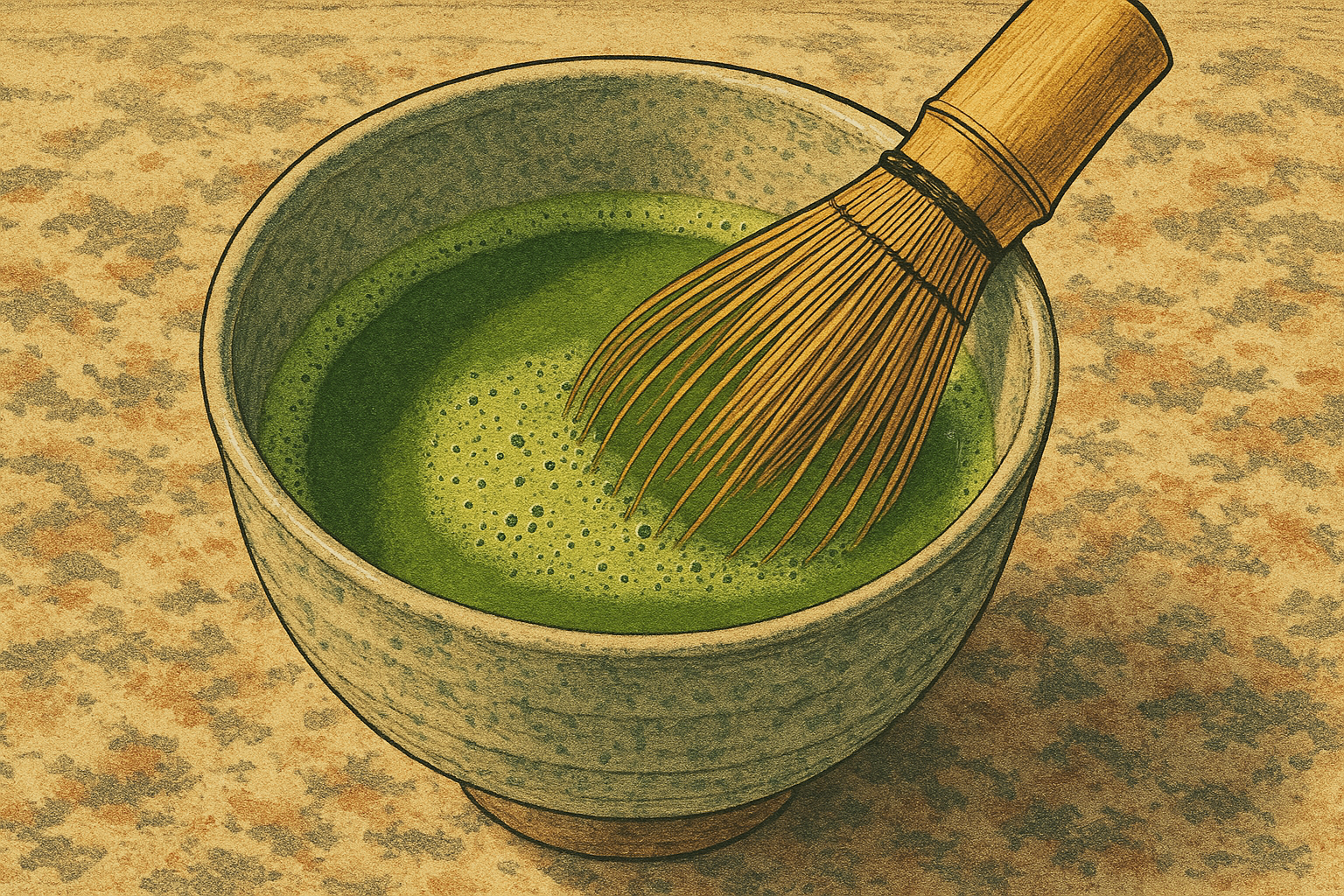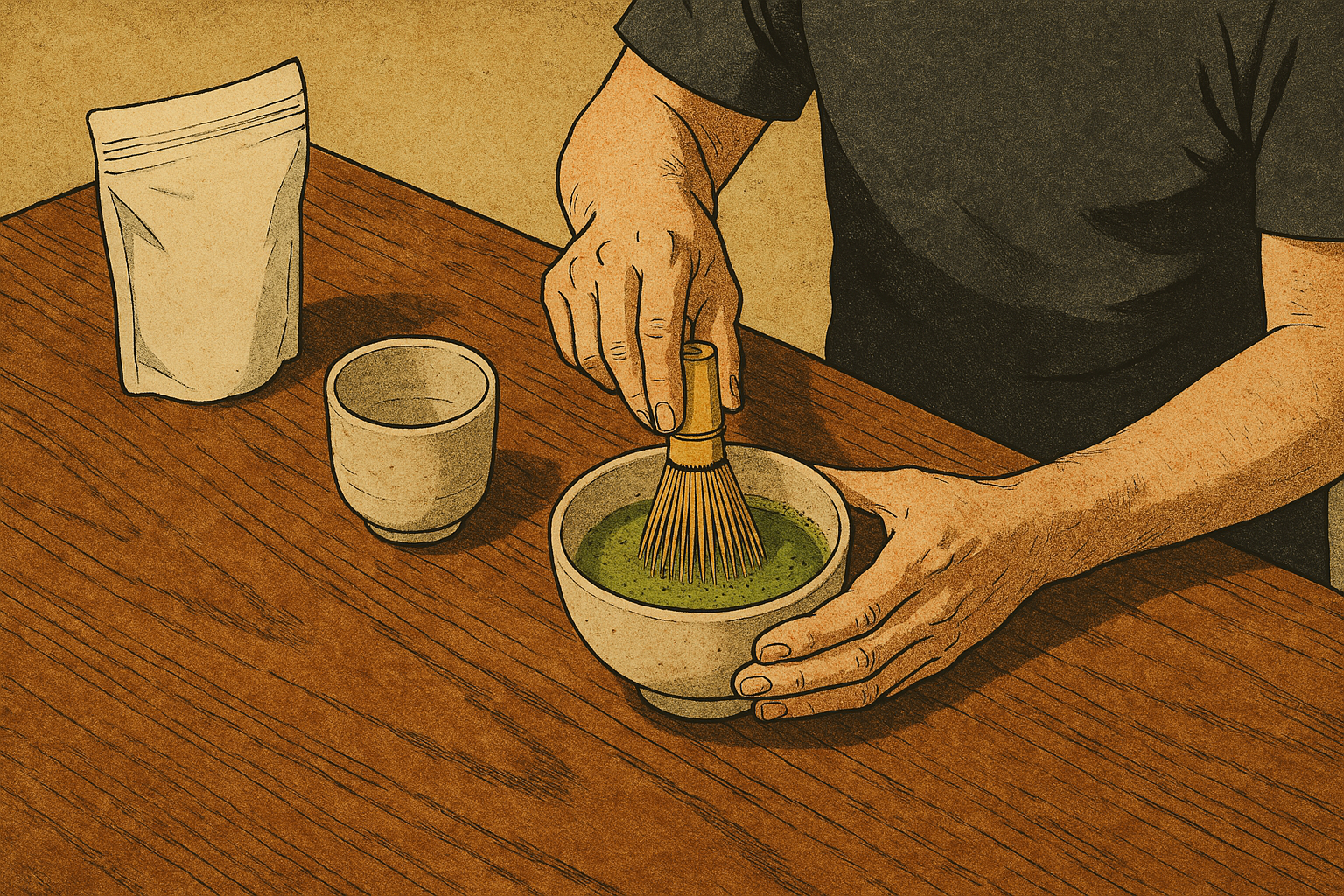Matcha has been a cornerstone of Japanese tea culture for centuries and valued for both its flavor and mindfulness ritual. Matcha is made from finely ground, shade grown green tea leaves gives a distinctive smooth taste and vibrant color that set it apart from regular teas. Beyond traditional ceremonies, it has found its place in modern kitchens and baked goods. In this blog, we explore the daily benefits of drinking matcha.
Promote Calmness and Focus
Starting your morning with a cup of Matsu no Midori matcha can help create a sense of calmness. This effect comes from L-theanine which is an amino acid that promotes alpha wave activity in the brain, associated with relaxation, focus and mental clarity.
L-theanine also supports the production of neurotransmitters such as serotonin and GABA, which help reduce stress and anxiety. Combined with matcha’s naturally low caffeine content this creates a stable balanced energy rather than the crash often experienced with coffee.
Boost Cognitive Performance
Matcha offers a rare combination of L-theanine and caffeine, which work together to enhance concentration and memory. While caffeine sharpens mental alertness, L-theanine balances overstimulation which helps you stay focused without the jitters.
Matcha is also rich in EGCG, a potent antioxidant that helps protect brain cells from oxidative stress, a factor linked to cognitive decline and memory loss. Incorporating matcha into your daily routine may support long-term brain health and mental performance.
Supports Cancer Prevention
Regular consumption of matcha green tea may play a role in reducing risk of cancer. Its high levels of EGCG (epigallocatechin gallate) help reduce oxidative stress and may inhibit the growth of cancerous cells.
These compounds protect DNA from damage and support the body’s natural defense against tumor formation. While research continues to explore these effects, incorporating premium matcha like Matsu no Midori into your daily routine can be a delicious way to enhance your intake of plant-based antioxidants and promote overall cellular health.
Improve Heart Health
Matcha’s antioxidants may contribute to better heart health by reducing inflammation and supporting healthy cholesterol levels. The tea’s catechins, particularly EGCG, are known for their ability to lower LDL (bad) cholesterol and triglycerides while improving insulin sensitivity.
These effects help reduce the risk of cardiovascular disease. Additionally, matcha’s antioxidant enzymes can protect blood vessel walls from oxidative damage which may contribute to more stable blood pressure and improved circulation over time.
Support Gut Health
Drinking matcha regularly may also promote a healthy digestive system. The EGCG in matcha helps balance gut flora by reducing harmful bacteria and encouraging the growth of beneficial microbes.
This makes matcha a potential ally for those managing digestive issues such as IBS (Irritable Bowel Syndrome), IBD (Inflammatory Bowel Disease) or SIBO (Small Intestinal Bacterial Overgrowth).
By supporting gut balance, matcha can contribute to better digestion, nutrient absorption and overall wellness.
May Help Regulate Blood Sugar
Matcha may assist in maintaining stable blood sugar levels by improving insulin sensitivity. It contains quercetin, a natural plant compound that supports insulin function and carbohydrate metabolism.
By helping your body use glucose for energy instead of storing it as fat, matcha can aid in energy balance and metabolic health which makes it a beneficial addition for those monitoring blood sugar levels.
May Support Healthy Weight Management
The combination of EGCG and caffeine in matcha may gently boost metabolism through a process called thermogenesis, which helps the body burn more calories even at rest.
Although this effect is modest, consistent matcha consumption paired with a balanced diet and active lifestyle can support long-term weight management goals. Beyond calorie burn, matcha also promotes sustained energy and focus, helping you maintain healthy habits throughout the day.
Potential Side Effects and Precautions
Matcha is generally safe and well-tolerated for most people but its natural caffeine content may cause mild side effects in sensitive individuals. Some may experience jitters, anxiety, irritability, headaches or difficulty sleeping, especially if consumed in large amounts or close to bedtime.
It’s also important to note that excessive matcha intake can affect liver enzyme function and interfere with the body’s natural detoxification processes. Because of this, individuals with preexisting health conditions or those taking medication should consult a healthcare provider before adding matcha to their daily routine to ensure safe and balanced consumption.
The Bottom Line
Whether you enjoy it as a warm latte or a refreshing iced drink, matcha offers a variety of potential health benefits. From supporting focus and heart health to aiding metabolism and blood sugar control, its rich blend of L-theanine, EGCG and antioxidants makes it a valuable addition to a balanced lifestyle.
To explore premium blends and learn more about the art of matcha, visit Cha Lab for high-quality selections crafted to elevate your daily ritual.



